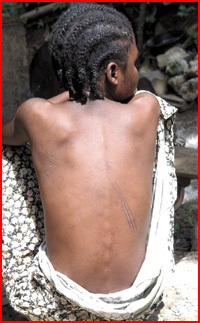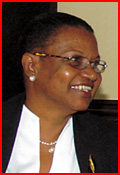Could Have Been Useful in Church Dayton Sex Scandal
By Brandon Allwood
The Jamaica Observer
August 13, 2006
http://www.jamaicaobserver.com/news/html/20060812T210000-0
500_111036_OBS_CHILDREN_S_REGISTRY_STILL_NOT_READY_.asp
Vital elements of a landmark piece of legislation that would have proven useful in the infamous Church Dayton scandal, in which a 13-year-old girl was allegedly sexually abused by three teenaged boys in front of a deacon, are yet to be established.
Two years after Parliament passed the Child Care and Protection Act (CCPA) to address the neglect and abuse of children in Jamaica, policy-makers have still not come up with the necessary regulations, including establishment of a Children's Registry.
"...If the registry had been put in place, we would have been able to charge the adults that witnessed the event (sexual abuse) but failed to report it," said Tania Chambers, legal consultant at the Jamaica Coalition on the Rights of the Child (JCRC).
 |
|
Physical abuse, such as that inflicted on this girl, should be reported under Section 6 of the Child Care and Protection Act. Photo by The Observer library |
Under Section 6 of the Act, any person who has knowledge of, or suspects that a child is being abused must report it to the Children's Registry. Failure to report offences against children, according to the law, will result in a $500,000 fine or six months in jail.
Chambers told the Sunday Observer that the registry was not established because the necessary regulations were not ready.
"Regulations have to be promulgated, and the government has been going through a process of developing regulations, but they have been using a consultative approach," she said.
"They have gotten several consultations and that has slowed down the process of establishing the registry," Chambers said, adding that section 6 of the CCPA was now collecting dust.
 |
| SAMUELS. people are supposed to be doing mandatory reporting, the law says they are supposed to report to the registry, but there's no registry |
Calls by the Sunday Observer to Health Minister Horace Dalley were not returned and a fax to the office of the Children's Advocate, Mary Clarke, did not elicit an immediate response.
The CCPA also makes provisions for the establishment of a Children's Advocate, who speaks on the behalf of children in legal difficulties.
"...In that case the other day with the 13-year-old girl who was sexually assaulted in the back of a van, if the registry had been put in place, we would have been able to charge the adults that witnessed the event but failed to report under the CCPA," Chambers said. "But ...the registry has to be in place before that section can be used in terms of charging and convicting people."
Chambers noted that a draft structure for the registry had been developed, but the people who had a say in promulgating the regulation "have to put a lot more energy into making sure that it happens (approving the regulations) in the shortest possible time."
Carol Samuels, executive director of the JCRC, was also anxious to see the registry in place.
"The registry, as we understand, was supposed to be up and running a short time after the act was enforced," said Samuels. "The minister (of health) is supposed to approve the regulations to set up the registry and he has not yet.
"Until those regulations are made, then that's going to retard the process of setting up the registry. People are supposed to be doing mandatory reporting, the law says they are supposed to report to the registry, but there's no registry," Samuels complained.
But despite the absence of the Children's Registry, the Child Development Agency (CDA) is going ahead with its own preparations for using the registry.
Rashida St Juste, public relations officer at the CDA, said her agency had been taking steps to ensure that when the registry was established it would function effectively.
"We have been going through a number of processes to make sure that when it is up and running it will function effectively and that it will function seriously," she said. "One of the things that we have to recognise is that it has very far-reaching implications for those who provide services to children.
"We have been doing things to inform the drafting legislation and procedure for the registry. We are trying to incorporate the feedback that we had gotten when we sent the first draft to key stakeholders, into a new draft to send to the Cabinet," St Juste said, adding that the CDA was "shooting for the end of September to submit it to the minister of health."
The CDA, an amalgamation of the services of the Children's Services Division, the Adoption Board and the Child Support Unit, has been investigating reports of mistreatment of children since its incorporation, said St Juste.
She encouraged people to call the CDA with their reports of child abuse, despite the absence of a formal structure, such as the registry.
But the children's registry is not the only thing missing in the implementation of the CCPA. The Sunday Observer found out that the section of the CCPA that speaks to new regulations for the licensing of children's homes and the responsibilities for those who run them, is yet to be established.
Operators of children's homes have the responsibility to provide sufficient food, sleeping arrangements, education, medical care and disciplinary action which may include forfeiture of rewards and privileges, temporary loss of recreation or, in exceptional circumstances, isolation from the other children.
Said Chambers: "Part of the purpose of the Child Care and Protection Act is to bring new standard into the operations of children's homes, and to ensure that children's homes are effectively monitored, and regulated and licensed by the government, but the regulations to make that work have not been put in place.
"Those regulations have actually gone further than the regulations for the children's registry, in that drafting instructions were actually prepared. However, I can't speak definitively about what has happened since then."
St Juste disclosed that the final drafting instructions for the regulation had been sent to the chief parliamentary council (CPC).
"They (the drafting instructions) are now with the CPC and after they (the chief parliamentary council) are through with it, the minister of health will present it to Parliament," said St Juste.
Chambers agreed with Opposition Senator Anthony Johnson's description of the measure as "sloppy legislation".
In addition to the problems with the implementation, there were several obvious gaps in the legislation itself, such as the fact that it did not make any attempt to redefine sexual offences, she said.
"It (the CCPA) did not make any serious attempt to deal with the upgrading of sexual offences, and that's an issue that the government says they are now trying to deal with, but it remains a glaring gap in the legislation.
Our sexual offence laws are very outdated. They passed most of them in the 1700s and so they don't reflect current issues in terms of the ways in which children, and even adults, can be sexually assaulted," she said.
The law also does not define what trafficking in children is, even though Section 10 of the Act prohibits it.
"...It does not define what trafficking is and that makes it difficult from a law enforcement perspective for people to be charged under that section," Chambers said.
The attorney also noted several disparities in the Act, and how it relates to age.
"Although the legislation states clearly all persons under the age of 18 are considered children, there are a lot of inconsistencies in terms of the age at which persons are allowed to engage in certain aspects of adulthood.
"So the age of consent has come under question. Because the age of consent is 16, and the age of majority is 18; there is that two-year gap that people don't quite get," Chambers stressed.
"Also, there is a provision in the law that talks about parents having the duty to send their children to school between the ages of four and 16. There is a question as why that provision ends at 16, when, for example, the average student remains in high school until age 17," the attorney lamented.
"The law does not speak to the government's duty to ensure that a child can access their right to an education. It speaks to the parent's duty to make sure that children go to school, but it doesn't speak to the duty of the government in terms of making sure that there are spaces, enough resources to make sure that all children, including children with disabilities, have their proper place in the education system," said Chambers.
Any original material on these pages is copyright © BishopAccountability.org 2004. Reproduce freely with attribution.